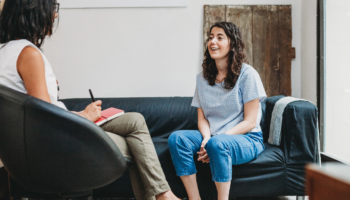The Benefits of Vulnerability
The Nystrom & Associates providers consulted for this article are Michelle Iversen, LMFT and Brett Cushing, LMFT. Michelle and Brett are Outpatient Therapists and the co-hosts of Psyched for Psychology.
Being vulnerable in the moment might be uncomfortable; however, vulnerability has many unforeseen benefits. Being vulnerable allows us to connect to others to cultivate healthy relationships, whether it's with family, friends, co-workers, or a partner. In the first podcast of Psyched for Psychology, co-hosts Michelle Iversen and Brett Cushing dive into The Benefits of Vulnerability. Keep reading to learn all about vulnerability from a therapist's perspective.
Related: 4 Conflict Resolution Skills for Better Relationships
What is Vulnerability?
First, let’s define vulnerability. Vulnerability is when someone openly shares their emotions, thoughts, and beliefs. Doing so not only fosters open communication but also helps to cultivate empathy within a relationship. Whether in our family or work environments, we are often in chronic environments of invalidation. We don’t know when we’ll be criticized next or believe we are only as good as our last mistake. We carry a weight of unpredictability. Nobody likes unpredictability and anxiety – it causes discomfort. But, if we don’t allow ourselves to be vulnerable to other people, that keeps us from being seen by the people we care about the most. So, what if we were to lean into that discomfort (when it makes sense) and use it as an opportunity to grow? It becomes easy to lean into openness once we learn the benefits of vulnerability. Related: 5 Benefits of TelehealthWhy is Being Vulnerable So Difficult?
Being vulnerable causes us to be seen and exposed, sometimes creating an underlying fear of rejection. For example, you might think, “What would happen to me if other people really saw me for who I am?” Michelle helps to explain this fear.Many people struggle with being vulnerable, and some people may be wired to be more "threat-sensitive" and therefore more likely to want to protect their thoughts and emotions from others (even in safe social situations). It may feel as though this will protect us from emotional harm, but it can sometimes damage our relationships with others when we don't allow any of our vulnerabilities to show.The good news is that there are ways to help us open up in our relationships. “Working in therapy, we can help to change this response and activate a helpful area in our brain associated with social safety," says Michelle. "This will increase our vulnerability with safe people in our lives, but at the same time, we will also increase our social connectedness with others and be seen as more authentic, strong, open, and courageous.” Related: Social Media and Mental Health: What's the Impact?






